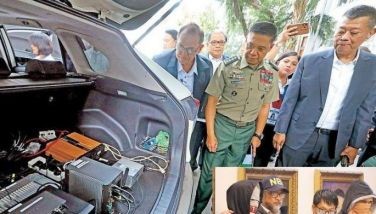ADB: BIR still most corrupt agency
March 18, 2001 | 12:00am
The Bureau of Internal Revenue (BIR) has been tagged as the most corrupt government agency based on findings of prestigious research groups.
The Washington SyCip Policy Center (WSPC), in a research paper commissioned by the Asian Development Bank (ADB), said the BIR remains the "biggest fish" in terms of corruption ratings, estimating that money involved could reach as much as P300 billion.
On the other hand, the Social Weather Stations’ survey for Transparent Accountable Government (TAG) revealed that the BIR once again topped the list of government agencies perceived to be the most corrupt in the area of revenue administration.
Other agencies named in the TAG corruption survey are the Bureau of Customs for revenue administration, Department of Public Works and Highways and the Department of Education, Culture and Sports for procurement, and the Philippine National Police, for protection from harassment.
While official estimates of the money involved cannot be substantiated, several agencies still have come up with their own figures.
In a study made by the World Bank, the Office of the Ombudsman estimates that the Philippine government lost up to $48 billion in the last 20 years to corruption.
The Commission on Audit estimates that the national government loses some P2 billion annually to corruption.
In a recent forum sponsored by WSPC and the United States Agency for International Development, a top corruption expert warned of a new wave of corruption in the local levels.
"With the transfer of administrative and political powers to local government units, cities and municipalities are expected to play a new role, one that they are ill-equipped to carry out," said Dr. Robert Klitgaard.
He said the potential wave of corruption came to the Philippines when the national government was decentralized in 1992 through the enactment of the Local Government Code.
"With that, the traditional politics of patronage familiar during the time of former strongman Ferdinand Marcos was brought down to the local level and dispersed throughout the country," the corruption expert said.
Klitgaard said the formula for corruption consists of increased monopoly, increased discretion and lower accountability. To combat this, he said enforcers of good government and activists must get the cooperation of government officials and employees and the private sector.
"With their help, the final stage in subverting a corrupt system would be to go after the big fish," he said.
During discussions, it was agreed upon that the Philippines is in a rare opportunity to prosecute the big fish in the plunder case involving deposed President Joseph Estrada and his friends.
Participants agreed that this would allow the new government to demonstrate strong political will in prosecuting corrupt officials, which would serve as a precedent for future prosecution or prevention.
The Washington SyCip Policy Center (WSPC), in a research paper commissioned by the Asian Development Bank (ADB), said the BIR remains the "biggest fish" in terms of corruption ratings, estimating that money involved could reach as much as P300 billion.
On the other hand, the Social Weather Stations’ survey for Transparent Accountable Government (TAG) revealed that the BIR once again topped the list of government agencies perceived to be the most corrupt in the area of revenue administration.
Other agencies named in the TAG corruption survey are the Bureau of Customs for revenue administration, Department of Public Works and Highways and the Department of Education, Culture and Sports for procurement, and the Philippine National Police, for protection from harassment.
While official estimates of the money involved cannot be substantiated, several agencies still have come up with their own figures.
In a study made by the World Bank, the Office of the Ombudsman estimates that the Philippine government lost up to $48 billion in the last 20 years to corruption.
The Commission on Audit estimates that the national government loses some P2 billion annually to corruption.
In a recent forum sponsored by WSPC and the United States Agency for International Development, a top corruption expert warned of a new wave of corruption in the local levels.
"With the transfer of administrative and political powers to local government units, cities and municipalities are expected to play a new role, one that they are ill-equipped to carry out," said Dr. Robert Klitgaard.
He said the potential wave of corruption came to the Philippines when the national government was decentralized in 1992 through the enactment of the Local Government Code.
"With that, the traditional politics of patronage familiar during the time of former strongman Ferdinand Marcos was brought down to the local level and dispersed throughout the country," the corruption expert said.
Klitgaard said the formula for corruption consists of increased monopoly, increased discretion and lower accountability. To combat this, he said enforcers of good government and activists must get the cooperation of government officials and employees and the private sector.
"With their help, the final stage in subverting a corrupt system would be to go after the big fish," he said.
During discussions, it was agreed upon that the Philippines is in a rare opportunity to prosecute the big fish in the plunder case involving deposed President Joseph Estrada and his friends.
Participants agreed that this would allow the new government to demonstrate strong political will in prosecuting corrupt officials, which would serve as a precedent for future prosecution or prevention.
BrandSpace Articles
<
>
- Latest
- Trending
Trending
Latest




























